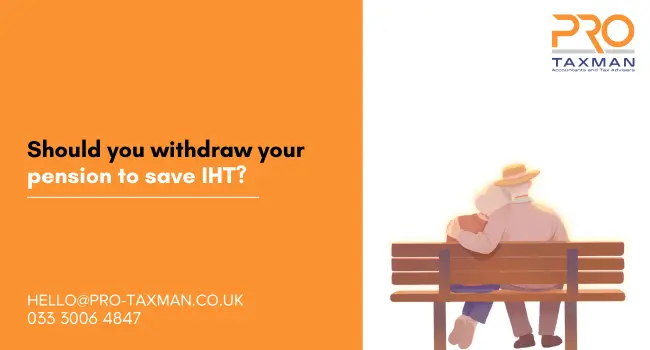Legislation has been published in draft for inclusion in the Finance Bill which will bring unused pension pots within the charge to inheritance tax from 6 April 2027.
In light of this change, pension savers may be considering withdrawing pension funds to prevent such a charge. Is this a good idea?
The first point to note is that this is not yet law and, assuming it does come into effect, it will not do so until 6 April 2027. Therefore, there is no need to be hasty. There is also much speculation that the forthcoming Budget will include further pension changes; but as yet, whether this comes to pass and what such changes will look like is not yet known.
Accessing personal pension savings
Anyone with a money purchase pension plan can currently access this once they have reached age 55. This is to rise to 57 from 6 April 2028.
It should be noted that taking a pension before age 55 (or before age 57 after 6 April 2028) will trigger an unauthorised payment charge. This is potentially very costly and, depending on the amount of the pension pot, which is accessed, could be as much as 55%. At best, the charge will not be less than an IHT charge on unused funds and may actually be more.
Where a person has reached age 55 and wants to flexibly access their pension pot, currently they can take a tax-free lump sum of 25% (capped at £268,275). It remains to beseen whether the Chancellor will opt to change this. Once the tax-free lump sum has been taken, further withdrawals are taxed at the recipient’s marginal rate of tax. When making withdrawals, consideration should be given to whether the tax cost of withdrawing funds is more than the potential IHT charge if they remain in the pension pot at death. For additional and higher rate taxpayers, there are no savings to be had by withdrawing funds in excess of the tax-free lump sum.
It is also important to remember that once a pension pot has been flexibly accessed, the ability to make further contributions is capped by the money purchase pension allowance (currently £10,000 a year) where this is less than earnings.
Consider the beneficiary
Before withdrawing pension funds to save IHT, it is important to assess who would benefit from those funds if they remained in the pension pot at death. If the beneficiary is a spouse or civil partner, the inter-spouse exemption would be in point and there would be no IHT to pay.
Consider the value of the estate
It is also important to consider the likely value of the death estate and whether it would be sheltered by the available nil rate bands and existing exemptions. If the estate (including any unused pension pots) would not be a chargeable estate, there is no IHT to save by withdrawing the funds.
Consider all tax charges
It is really important that the potential IHT saving is not looked at in isolation – all potential tax charges must be considered to assess whether there are overall savings to be had.
Once the tax-free lump sum has been withdrawn, further withdrawals will be taxed at the recipient’s marginal rate. If the amounts withdrawn exceed the personal allowance, there will be income tax to pay.
If the amounts are withdrawn (possibly triggering an income tax charge) and remain in the estate at death, the funds will be taken into account in working out the IHT charge on death – it does not matter whether they are inside the pension pot or not.
Consideration may be given to withdrawing funds and making lifetime transfers. Here it depends on how this is done. If a regular pension is withdrawn and the income is passed on, the gifts out of income exemption will apply as long as the donor has sufficient remaining income to live on. If tax is paid at less than 40% on the amounts withdrawn, there may be some tax savings.
If a lump sum is withdrawn and a capital sum is passed on, the donor will need to live for seven years from the date of the gift for the gift to fall out of charge for IHT purposes. Again, the Chancellor may change this rule.
There is no one correct answer – the best approach will depend on circumstances and may involve something of a gamble on what the Chancellor may reveal on 26 November.
Need professional accounting service or tax advice? Contact us to book a 15-min Free Consultation with us today.
To find out more please follow us on Facebook, Instagram, or LinkedIn. Feel free to contact us on 0333 006 4847 or request a call back by texting 075 6464 7474

